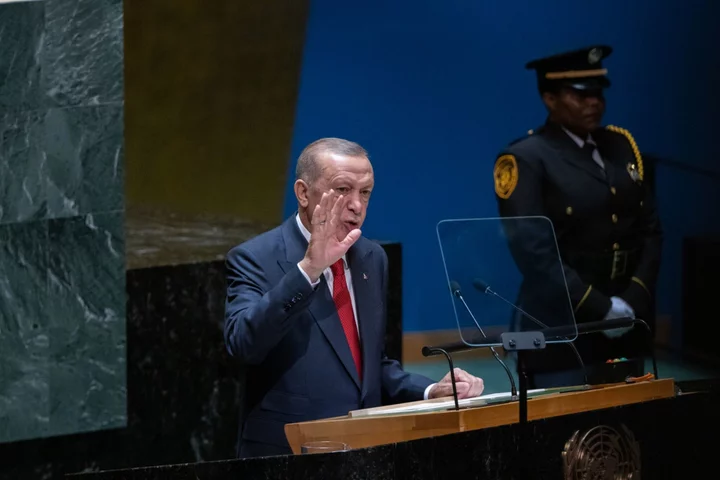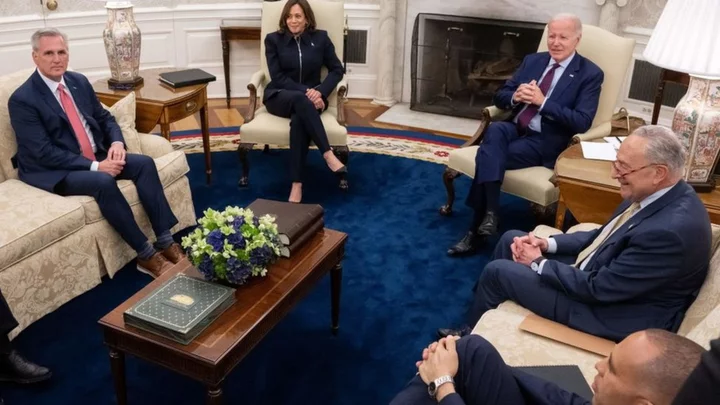One of Europe’s longest-standing grudges is ripe to be mended.
This time last year, Greek Prime Minister Kyriakos Mitsotakis and President Recep Tayyip Erdogan were trading barbs. Three years ago, the countries came close to the brink of war. Now, the two quarrelsome allies on NATO’s southern flank are making a historic push to be friends.
Both sides stand to gain if they can turn the page on decades of recrimination.
“We will have nothing to benefit from a very aggressive Turkey that cuts its ties with the West and will be a problem for us,”Mitsotakis said in an interview with Bloomberg Television in New York. “We’ve reached a point where we can be reasonably optimistic that Turkey also understands where its long-term interests lie.”
Since Erdogan won reelection in June, Turkey has set out to rebuild its economic credibility, appointing a new central bank chief and finance minister to draw a line under policies of the recent past. Despite steep interest-rate hikes from one and sober rhetoric from the other, the lira is down 32% this year and the country needs to woo foreign investment.
Both sides know that rapprochement may be pivotal to those efforts — in part because Greece’s European Union membership helps to elevate its disagreements with Turkey to bloc-wide concerns.
Greek officials are privately prepared to exercise leverage over specific measures that Turkey seeks from Europe, ranging from visa liberalization to trade.
The EU parliament earlier this year censured Turkey, citing the dispute over Cyprus, a Mediterranean island divided by a Turkish presence for 50 years. Greece supports the Cyprus government’s position to reunify the island as a bi-zonal federation. Turkey favors a two-state solution.
An EU report said Turkey’s accession “cannot resume under the current circumstances,” and criticized a lack of progress to resolve power-sharing in the island and unauthorized drilling in adjacent waters.
The Conflicts That Keep Turkey and Greece at Odds: QuickTake
With both leaders’ re-election this summer, Mitsotakis and Erdogan now have the political capital to resolve the disagreements that have bedeviled the relationship for decades.
The Cyprus dispute weighs heavy at a time when Russia’s war in Ukraine has shed harsh light on energy security in the region. Progress would allow the export of eastern Mediterranean oil and gas to Turkish markets and Europe via a pipeline from the island.
Little Common Ground
The path to rapprochement is mapped out by a series of high-level meetings taking place through December, where these issues will be on the agenda. Earlier this week, the leaders met on the sidelines of the UN General Assembly in New York for the second time in two months, and released identical readouts confirming their determination to maintain momentum.
The challenge is that while there may be unprecedented political will between the two sides, there is little common ground. According to people familiar with the substance of the talks and with the negotiating position of each side, solutions are likely to remain out of reach when Greece and Turkey can barely agree on the framework to resolve their problems.
Troubled Waters
Greece’s preference is to hive off the issue of maritime-border resolution, taking it before the international courts. It’s a disagreement which in 2020 brought the two NATO member states to the brink of military confrontation. But Turkey wants to treat the knot of mutual disagreements as a package, according to the people familiar with the negotiations, who asked not to be named citing the talks’ sensitivity.
“We only talk about one main dispute. And the truth is that there’s no way we can talk substantively with Turkey, if they continue to challenge the sovereignty of Greek islands,” said Mitsotakis. “No prime minister, certainly not myself would be willing to enter into this discussion. So this is off the table. And I’ve made this very clear to president Erdogan”
Collateral Gains
The distance between the two sides’ positions may not be fatal to an improvement in the relationship, when there are so many collateral gains to be made.
“For Ankara the most important thing is to cultivate the impression that it wants new talks,” said Ryan Gingeras, a professor of national security at the Naval Postgraduate School. Turkey is seeking “to engage in a process of negotiation for the benefit of European audiences,” he told Bloomberg.
Greece meanwhile seeks to build on recent economic advances, and a permanent war footing doesn’t help. The country’s sovereign-credit rating was raised two notches by Moody’s last week, bringing it a step away from the investment-grade status that it last held 13 years ago.
After winning a second term in office, Mitsotakis pledged to reduce Greece’s debt ratio to below 140% of output by 2027, from the highs of 206% in 2020.
“It doesn’t necessarily mean that the choice is either full agreement to resolve this issue in the International Court in the Hague or being on the brink of war,” Mitsotakis told Bloomberg. “We can have a good relationship, even if we agree to disagree on certain major, major issues of the agenda.”
--With assistance from Inci Ozbek and Sotiris Nikas.
(Updates with details on dispute in paragraph eight. A previous version corrected a reference to Greece and Cyprus.)
Author: Paul Tugwell, Selcan Hacaoglu and Viktoria Dendrinou









